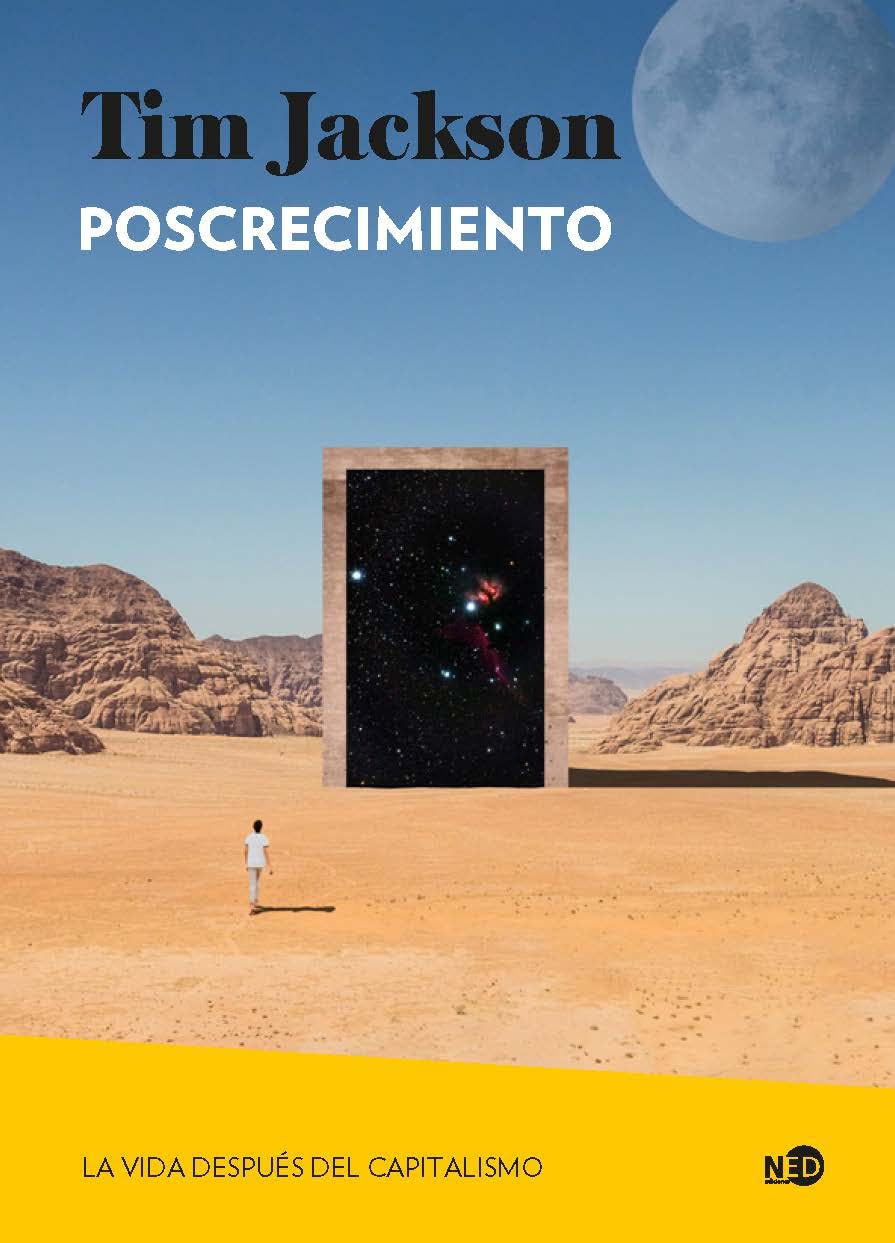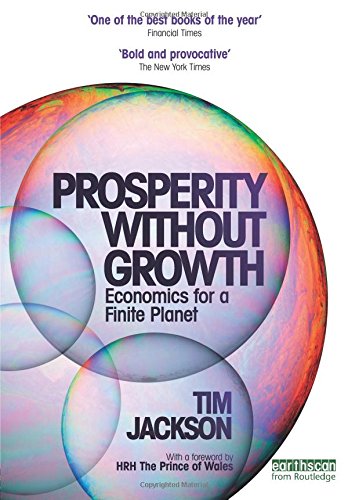Tim Jackson. Living better with less
- In transit
- Oct 23
- 7 mins

There is life after capitalism. This is the view of economist and ecologist Tim Jackson, who asks: “Why aren’t rich countries always happier than poor countries?” He argues that we live in an iron cage, captive to the myth of eternal growth and the mantra that has made us believe that growth is always a good thing. But high-income countries have lower happiness scores than lower-income countries. And, surprisingly, they also have lower life expectancy.
Tim Jackson, Director of the Centre for the Understanding of Sustainable Prosperity (CUSP)[1] and Professor of Sustainable Development at the University of Surrey, argues that having a good life does not mean having more material stuff, and that we can have fun with less. For years now, he has been talking about a concept that, for some, is a utopia, but which he believes is already a reality: post growth. He now invites us to ask ourselves whether abundance is really synonymous with progress, especially if we want to continue to exist on this planet, which has environmental, social and economic limits.
Tim Jackson – who has worked for the UK Government, the United Nations and the European Commission – visited Barcelona to present his latest book, Post Growth. Life after Capitalism (Polity Press, 2021). This book is a reflection on what might happen if this obsession with growth were to end and we were to consider a new way of understanding the progress of humanity.
The professor underlines that economic growth has undoubtedly been of tremendous benefit to society; it has brought us nutrition, medicine, shelter, mobility, connectivity, entertainment… just to name a few of its benefits. But it has also unleashed unprecedented chaos on the natural world, especially over the last 150 years. Jackson therefore challenges us to embrace a new economic model that does not depend on voracious consumption that is jeopardising the planet’s ecological balance. “Our world suffers from a kind of arrogance. The arrogance of the gambling addict and the delusional narcissist. We think that we can defy nature and win.”
Prosperity on a finite planet
Prosperity is usually measured in terms of a country’s GDP: what it produces, how much revenue it brings in and how much money it spends. But the writer criticises the fact that the economy is measured by these very parameters instead of assessing “how well we are doing, how well our communities are, how strong our relationships are, and how healthy we are”. And obviously, Jackson adds, the degree of commitment to protecting the environment should also matter.
He has spent his entire career rethinking prosperity in terms of human progress, rather than using the narrow economic definition we have all grown up with. But what does prosperity mean on a planet with finite resources? In the conversation we had in Barcelona, he made reference to the word’s interesting etymology, derived from Latin and that conveys our hopes and expectations. In other words, “prosperity means something much broader than how busy we are in the economy, and sometimes growth can be a thorn in our side”.
 Tim Jackson visited Barcelona to present his latest book, as part of the Fira Literal literary festival. © Marc Javierre
Tim Jackson visited Barcelona to present his latest book, as part of the Fira Literal literary festival. © Marc JavierreIn fact, Jackson argues that prosperity is closely related to physical health. When asked what is most important in life, the answer is always the same: being healthy. That is why he believes that a prosperous society should have health at the top of its list of priorities. And instead of GDP, we should measure a society’s physical and mental well-being. In other words, the things that really matter.
A post-growth world
Tim Jackson cites the example of the evolution of labour productivity in the United Kingdom, the very country where the industrial revolution began. At the beginning of the 20th century, it began to grow every year and continuously until 1960. And the labour productivity curve peaked in 1966. But from then on, it began to steadily decline. Many now believe that the desired growth has not materialised because of the financial crisis, but it is precisely the financial crisis that is at the end of the curve’s downturn. Labour productivity growth rates had already fallen to less than 1% per year before 2008. So the slowdown in the economy had begun many years earlier.
Labour productivity is the foundation of economic growth. In theory, it is what has led us to prosperity. The problem is that it is getting harder to achieve every day. “Just before the pandemic, labour productivity growth in the UK was virtually zero, and this is very hard for mainstream economics and capitalism to digest.”
The economist and ecologist explains that productivity is also falling in the United States, across OECD nations and in some emerging economies, such as China, although it hasn’t fallen that far. “In the United States, the flagship of capitalism, half of the 1980s generation is living worse than their parents did when they were the same age.”
As an example, in his book, Jackson argues that in the early 2020s, the average growth rate of OECD countries was only 2%. “And the most important part of all this is that we are starting to live in a post-growth economy, but we don’t have the tools to deal with it; we don’t understand how to make things work in this situation, and this is one of the major challenges that drives my work.”
When labour productivity rises, workers’ wages rise. But when it falls, profit margins are squeezed and have to be shared between shareholders and wages. Inequality is created because productivity growth only moves in one direction. “You can see it in the statistics, from the 1970s on. The bulk of the economic growth was going to the richest in society, and the poorest were actually becoming poorer, because austerity has been imposed on them.”
The subtitle of Tim Jackson’s book is “Life after Capitalism”, and he quotes billionaire and cloud computing pioneer Marc Benioff: “Capitalism, as we know, it is dead”. For him, today’s economic system is broken, as it does not allow everyone to have the same living conditions due to its dysfunctionalities. “We have welfare, happiness, prosperity, at the expense of other people. We don’t know when our bridge will collapse, but if we look around us we find that the bridge has already collapsed for other people.”
Prosperity without economic growth – is it possible?
According to Tim Jackson, we have to think about what kind of economy we want and what kind of enterprise can give us prosperity without growth. He believes our economies should invest in sectors such as health, education, crafts and creativity, and place more emphasis on labour-intensive activities that do not have a huge carbon footprint. “These are the jobs that the people who looked after us when we were hit by the pandemic were doing. They could help us create a new economy that is materially light, but employment-rich, with satisfying jobs, jobs that are based on helping other people and improving their quality of life.” Jackson believes that we must take our structural allegiance to growth very seriously.
He also warns that we cannot turn off growth, like turning off a switch, turn around the corner, find ourselves in a land of degrowth and celebrate it. There is hard work to be done and a deeper exploration of the underlying values in our society is imperative. “This is not a task that politicians like to do, and unfortunately neither do economists, who prefer to believe in the fairy tale of eternal economic growth”. The title Post Growth. Life after Capitalism is an invitation to engage in a deeper dialogue about the nature of our economy, but also about our place in the world and in nature. A reflection on the human condition in the 21st century and what we need to change. A realistic and hopeful vision of a different world.
Note
[1] Centre for the Understanding of Sustainable Prosperity. cusp.ac.uk
Recommended reading
 Post Growth: Life After CapitalismPolity Press, 2021
Post Growth: Life After CapitalismPolity Press, 2021 Prosperity without Growth: Economics for Finite PlanetEarthscan Publications, 2011
Prosperity without Growth: Economics for Finite PlanetEarthscan Publications, 2011
The newsletter
Subscribe to our newsletter to keep up to date with Barcelona Metròpolis' new developments




